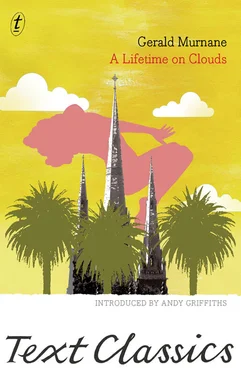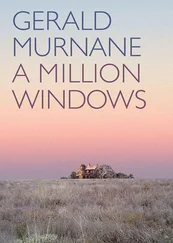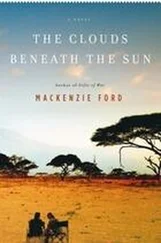But Adrian was not really interested in the words. Nearly every night on 3KZ he heard a few short passages of music that seemed to describe the landscape of America. The opening notes of a romantic ballad might have just the right blend of vagueness and loneliness to suggest the Great Plains States. Or the last hectic chorus of a Mitch Miller record might put him in mind of the sensual Deep South where it was always summer.
The wireless was switched off again at seven. No one wanted to hear the news or the serials and musical programmes that followed it. Mr Sherd went to bed early to finish one of the stack of books that his wife borrowed each week from the library behind the children’s-wear shop in Accrington (Romance, Crime, Historical Romance, New Titles). Mrs Sherd sat by the kitchen stove knitting. Adrian’s brothers played with their Meccano set or traced through lunch-wrap paper some pictures from the small stack of old National Geographic magazines in the lounge-room. Adrian began his homework.
The house was quiet. There was rarely the sound of a car or truck in Riviera Grove or the streets around it. Every half-hour an electric train passed along the line between Melbourne and Coroke. It was nearly a mile from the Sherds’ house, but on windless nights they heard clearly the rattling of the bogeys and the whining of the motor. As the noise died away, Adrian’s brothers called out ‘Up!’ or ‘Down!’ and argued over which way the train had been heading.
Adrian worked at his homework until nearly ten o’clock. Every day at school three or four boys were strapped for not doing their homework. Their excuses astonished Adrian. They had gone out, or started listening to the wireless and forgotten the time, or been told by their parents to sit up and talk to the visitors. Or they had been sent to bed because there was a party going on at their house.
In the two years since the Sherds had moved to Accrington, they had almost never gone out after dark. And Adrian could not remember anyone visiting them at night. The boys who had other things to do instead of homework came from the suburbs close to Swindon — places with made roads and footpaths and front gardens full of shrubs. The suburbs had dignified names such as Luton and Glen Iris and Woodstock. Adrian imagined the houses in these suburbs full of merry laughter every night of the week.
When his homework was finished Adrian went out for a few minutes to the back shed. He switched on the light and lowered his model railway track to the floor. On the wood beneath the tracks was a faint pencilled outline of the United States of America. Adrian wound up his clockwork engine. He lowered it onto the rails near New York City and hooked two passenger coaches behind it. The train sped south-west towards Texas then around past California to Idaho and on across the prairies to the Great Lakes. At Chicago there was a set of points. Adrian switched them so that the train travelled first around the perimeter of the country (Pennsylvania, New York State, New England and back to New York City) and then, on each alternate lap, down through the Midwest and the Ozarks to rejoin the main line near Florida.
After four or five laps of the track the train slowed down and came to a stop. Adrian noted carefully the exact place where its journey ended. Then he put the engine and coaches away and went back to the house and got ready for bed.
The map in Adrian’s shed was crudely drawn. The proportions of America were all wrong. The country had been twisted out of shape to make its most beautiful landscapes no more than stages in an endless journey. But Adrian knew his map by heart. Each few inches of railway track gave access to some picturesque scene from American films or magazines. No matter where the train might stop, it brought him to familiar country.
Nearly every night Adrian made an American journey and found himself in some pleasant part of the American outdoors. Sometimes he was content to wander there alone. But usually he went in search of American women. There were dozens to choose from. He had seen their pictures in Australian newspapers and magazines. Some of them he had even watched in films. And all of them were just as beautiful as he had imagined them.
In the weeks before the coronation of the new Queen, Adrian and his mother made a scrapbook out of cuttings from the Argus and the Australian Women’s Weekly. On the night when the coronation was broadcast direct from London, the Sherds sat round the wireless with the scrapbook open on the kitchen table. They followed the exact route of the procession on a large map of London. When the commentator described the scene in Westminster Abbey they tried to find each of the places mentioned on a labelled diagram, although some of the Protestant terms like transept and nave confused them a little.
When nothing much was happening in the Abbey, Adrian feasted on the choicest items in the scrapbook — the coloured illustrations of the crown jewels and Her Majesty’s robes and regalia. They were the most beautiful things he had ever seen. He delighted in every sumptuous fold of the robes and every winking highlight of the jewels. Then, to appreciate their splendour still more, he compared them with other things he had once thought beautiful.
A few years before, when he was an altar boy, he used to stare each morning at the patterns on the back of the priest’s chasuble. There was one with the shape of a lamb outlined in amber-coloured stones on a background of white. The lamb held in its upraised foreleg a silver staff with a golden scroll unfurled at the top. The whole design was topped by the disc of an enormous Host with rays beaming from it and the letters I.H.S. across it in beads the colour of blood.
Adrian had once asked the priest after mass whether the stones and beads on the chasuble were proper jewels. The priest had looked a little apologetic and said no, the parish wasn’t wealthy enough for that. They were (he paused) semi-precious stones. Adrian was not at all disappointed. Any sort of precious stones appealed to him.
On coronation night Adrian studied the picture in the Argus of Her Majesty’s robe and saw that no chasuble could rival it.
The solemn ceremony of the coronation itself was too much for Adrian to visualise with only the wireless broadcast to help him. But two days later when the Argus published its full-colour souvenir supplement, he saw the scene in the Abbey in all its splendour. He compared all that magnificence with two scenes that he had once thought would never be surpassed for beauty.
Years before, he had watched a film about the Arabian Nights. It was the first technicolor film he had seen. Evelyn Keyes was a princess guarded by black slaves in her father’s palace. Cornel Wilde was the man who fell in love with her and tried to elope with her. At one point in the film, the slaves were carrying Evelyn Keyes through the streets of Baghdad in a sedan chair. She was inside her private compartment, concealed by thick purple and gold drapery. Cornel Wilde stopped the slaves and tried to fight them. Evelyn Keyes peeped out for a few seconds and smiled shyly at him.
Adrian never forgot that brief glimpse of her. She was dressed in pastel-coloured satins. A white silk veil covered part of her face, but anyone could see she was breathtakingly beautiful. Her complexion was a radiant pinkish-gold, and the gorgeously coloured fabrics around her set it off to perfection.
In one of his adventures, Mandrake the Magician (in the comic strip at the back of the Women’s Weekly ) found a race of people like Ancient Romans living on the far side of the moon. When they were ready for sleep at night, the Moonlings climbed onto filmy envelopes inflated with a special light gas. All night long the handsome moon-dwellers, in long white robes, sprawled on their transparent cushions and wafted from room to room of their spacious houses.
Читать дальше












